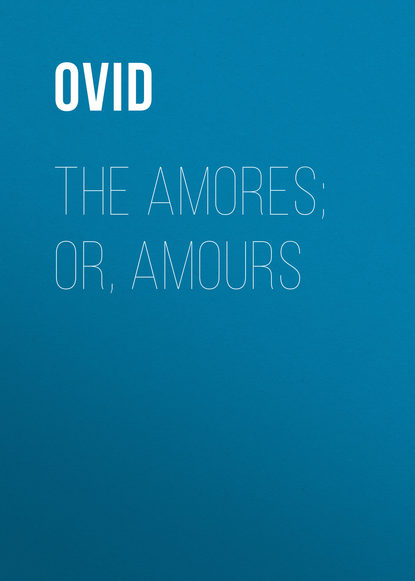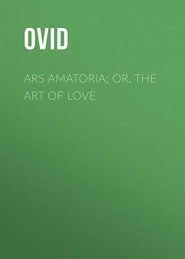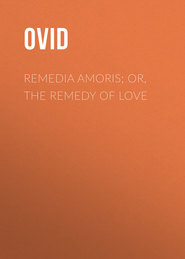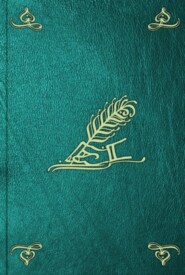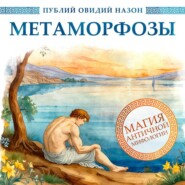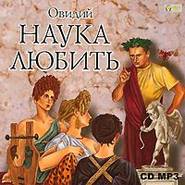По всем вопросам обращайтесь на: info@litportal.ru
(©) 2003-2024.
✖
The Amores; or, Amours
Настройки чтения
Размер шрифта
Высота строк
Поля
[ Anxieties of the prison.—Ver. 64. He alludes to the 'ergastulum,' or prison for slaves, that was attached to most of the Roman farms, whither the refractory slaves were sent from the City to work in chains. It was mostly under ground, and, was lighted with narrow windows, too high from the ground to be touched with the hand. Slaves who had displeased their masters were usually sent there for a punishment, and those of uncouth habits were kept there. Plutarch says that they were established, on the conquest of Italy, in consequence of the number of foreign slaves imported for the cultivation of the conquered territory. They were finally abolished by the Emperor Hadrian.]
077 (return (#x1_x_1_i122))
[ Bird is arousing.—Ver. 66. The cock, whom the poets universally consider as 'the harbinger of morn.']
078 (return (#x1_x_1_i122))
[ Equally slaves.—Ver. 74. He called the doors, which were bivalve or folding-doors, his 'conservæ,' or 'fellow' slaves,' from the fact of their being obedient to the will of a slave. Plautuâ, in the Asinaria, act. ii sc. 3, has a similar expression:—'Nolo ego fores, conservas meas a te verberarier.' 'I won't have my door, my fellow-slave, thumped by you.']
080 (return (#x1_x_1_i126))
[ Did not Ajax too.—Ver. 7. Ajax Telamon, on being refused the arms of Achilles, became mad, and slaughtered a flock of sheep, fancying that they were the sons of Atreus, and his enemy Ulysses. His shield, formed of seven ox hides, is celebrated by Homer.]
081 (return (#x1_x_1_i126))
[ Mystic Goddesses.—Ver. 10. Orestes avenged the death of his father, Agamemnon, by slaying his own mother, Clytemnestra, together with her paramour, Ægistheus. He also attempted to attack the Furies, when they haunted him for the murder of his mother.]
082 (return (#x1_x_1_i127))
[ Daughter of Schceneus.—Ver. 13. Atalanta, the Arcadian, or Mae-nalian, was the daughter of Iasius, and was famous for her skill in the chase. Atalanta, the Boeotian, was the daughter of Schceneus, and was renowned for her swiftness, and for the race in which she was outstripped by Hippomenes. The Poet has here mistaken the one for the other, calling the Arcadian one the daughter of Schoeneus. The story of the Arcadian Atalanta is told in the Eighth Book of the Metamorphoses, and that of the daughter of Schceneus, at the end of the Tenth Book of the same work.]
083 (return (#x1_x_1_i128))
[ The Cretan damsel.—Ver. 16. Ariadne, the daughter of Minos, when deserted on the island of Naxos or Cea.]
084 (return (#x1_x_1_i128))
[ Cassandra.—Ver. 17. Cassandra being a priestess, would wear the sacred fillets, 'vittse.' She was ravished by Ajax Oileus, in the temple of Minerva.]
085 (return (#x1_x_1_i130))
[ The humblest Roman.—Ver. 29. It was not lawful to strike a freeborn human citizen. See Acts, c. xxii. v. 25. 'And as they hound him with thongs, Paul said unto the Centurion that stood by, Is it lawful for you to scourge a man that is a Roman, and uncondemncd?' This privilege does not seem to have extended to Roman women of free birth.]
086 (return (#x1_x_1_i130))
[ Strike a Goddess.—Ver. 32. He alludes to the wound inflicted by Diomedes upon Venus, while protecting her son Æneas.]
087 (return (#x1_x_1_i131))
[ Her hurt cheeks—Ver. 40. He implies by this, to his disgrace which has made her cheeks black and blue by his violence.]
089 (return (#x1_x_1_i132))
[ At the middle.—Ver. 48. He says that he ought to have been satisfied with tearing her tunic down to the waist, where the girdle should have stopped short the rent; whereas, in all probability, he had torn it from the top to the bottom.]
090 (return (#x1_x_1_i132))
[ Her free-born cheeks.—Ver. 50. It was a common practice with many of the Romans, to tear and scratch their Slaves on the least provocation.]
091 (return (#x1_x_1_i132))
[ The Parian mountains.—Ver. 52. The marble of Paros was greatly esteemed for its extreme whiteness. Paros was one of the Cyclades, situate about eighteen miles from the island of Delos.]
092 (return (#x1_x_1_i134))
[ Their proper order. —Ver 68. 'In statione,' was originally a military phrase, signifying 'on guard'; from which It came to be applied to any thing in its place or in proper order.]
094 (return (#x2_x_2_i2))
[ Does she derive.—Ver. 3. He says that her name, 'Dipsas,' is derived from reality, meaning thereby that she is so called from the Greek verb [êtxpâui], 'to thirst'; because she was always thirsty, and never rose sober in the morning.]
095 (return (#x2_x_2_i2))
[ The charms of Ææa.—Ver. 5. He alludes to the charms of Circe and Medea. According to Eustathius, Ææa was a city of Colchis.]
096 (return (#x2_x_2_i2))
[ Turns back to its source.—Ver. 6. This the magicians of ancient times generally professed to do.]
097 (return (#x2_x_2_i2))
[ Spinning wheel.—Ver. 8. 'Rhombus,' means a parallelogram with equal sides, but not having right angles, and hence, from the resemblance, a spinning wheel, or winder. The 'licia' were the cords or thrums of the old warp, or the threads of the old web to which the threads of the new warp were joined. Here, however, the word seems to mean the threads alone. The spinning-wheel was much used in magical incantations, not only among the Romans, but among the people of Northern and Western Europe. It is not improbable that the practice was founded on the so-called threads of destiny, and it was the province of the wizard, or sorceress, by his or her charms, to lengthen or shorten those threads, according as their customers might desire. Indeed, in some parts of Europe, at the present day, charms, in the shape of forms of words, are said to exist, which have power over the human life at any distance from the spot where they are uttered; a kind of superstition which dispenses with the more cumbrous paraphernalia of the spinning-wheel. Some Commentators think that the use of the 'licia' implied that the minds of individuals were to be influenced at the will of the enchanter, in the same way as the old thrums of the warp are caught up and held fast by the new threads; this view, however, seems to dispense with the province of the wheel in the incantation. See the Second Book of the Fasti, 1. 572. The old woman there mentioned as performing the rites of the Goddess, Tacita, among her other proceedings, 'binds the enchantea threads on the dark-coloured spinning-wheel.']
098 (return (#x2_x_2_i2))
[ Venomous exudation.—Ver. 8. This was the substance called 'hippomanes,' which was said to flow from mares when in a prurient state. Hesiod says, that 'hippomanes' was a herb which produced madness in the horses that ate of it. Pliny, in his Eighth Book, says that it is a poisonous excrescence of the size of a fig, and of a black colour, which grows on the head of the mare, and which the foal at its birth is in the habit of biting off, which, if it neglects to do, it is not allowed by its mother to suck. This fictitious substance was said to be especially used in philtres.]
099 (return (#x2_x_2_i3))
[ Moon was empurpled.—Ver. 12. If such a thing as a fog ever exists in Italy, he may very possibly have seen the moon of a deep red colour.]
101 (return (#x2_x_2_i3))
[ That she, transformed.—Ver. 13. 'Versam,' 'transformed,' seems here to be a preferable reading to 'vivam,' 'alive.' Burmann, however, thinks that the 'striges' were the ghosts of dead sorcerers and wizards, and that the Poet means here, that Dipsas had the power of transforming herself into a 'strix' even while living, and that consequently 'vivam' is the proper reading. The 'strix' was a fabulous bird of the owl kind, which was said to suck the blood of children in the cradle. Seethe Sixth Book of the Fasti, 1. 141, and the Note to the passage.]
102 (return (#x2_x_2_i3))
[ A double pupil, too.—Ver. 15. The pupil, or apple of the eye, is that part through which light is conveyed to the optic nerve. Some persons, especially females, were said by the ancients to have a double pupil, which constituted what was called 'the evil eye.' Pliny the Elder says, in his Seventh Book, that 'all women injure by their glances, who have a double pupil.' The grammarian, Haephestion, tells us, in his Fifth Book, that the wife of Candaulcs, king of Lydia, had a double pupil. Heinsius suggests, that this was possibly the case with the Ialysian Telchines, mentioned in the Seventh Book of the Metamorphoses, 1. 365, 'whose eyes corrupting all things by the very looking upon them, Jupiter, utterly hating, thrust them beneath the waves of his brother.']
103 (return (#x2_x_2_i3))
[ And their grandsires.—Ver. 17. One hypercritical Commentator here makes this remark: 'As though it were any more difficult to summon forth from the tomb those who have long been dead, than those who are iust deceased.' He forgot that Ovid had to make up his line, and that 'antiquis proavos atavosque' made three good feet, and two-thirds of another.]
105 (return (#x2_x_2_i3))
[ The twofold doors.—Ver. 20. The doors used by the ancients were mostly bivalve, or folding doors.]
106 (return (#x2_x_2_i4))
077 (return (#x1_x_1_i122))
[ Bird is arousing.—Ver. 66. The cock, whom the poets universally consider as 'the harbinger of morn.']
078 (return (#x1_x_1_i122))
[ Equally slaves.—Ver. 74. He called the doors, which were bivalve or folding-doors, his 'conservæ,' or 'fellow' slaves,' from the fact of their being obedient to the will of a slave. Plautuâ, in the Asinaria, act. ii sc. 3, has a similar expression:—'Nolo ego fores, conservas meas a te verberarier.' 'I won't have my door, my fellow-slave, thumped by you.']
080 (return (#x1_x_1_i126))
[ Did not Ajax too.—Ver. 7. Ajax Telamon, on being refused the arms of Achilles, became mad, and slaughtered a flock of sheep, fancying that they were the sons of Atreus, and his enemy Ulysses. His shield, formed of seven ox hides, is celebrated by Homer.]
081 (return (#x1_x_1_i126))
[ Mystic Goddesses.—Ver. 10. Orestes avenged the death of his father, Agamemnon, by slaying his own mother, Clytemnestra, together with her paramour, Ægistheus. He also attempted to attack the Furies, when they haunted him for the murder of his mother.]
082 (return (#x1_x_1_i127))
[ Daughter of Schceneus.—Ver. 13. Atalanta, the Arcadian, or Mae-nalian, was the daughter of Iasius, and was famous for her skill in the chase. Atalanta, the Boeotian, was the daughter of Schceneus, and was renowned for her swiftness, and for the race in which she was outstripped by Hippomenes. The Poet has here mistaken the one for the other, calling the Arcadian one the daughter of Schoeneus. The story of the Arcadian Atalanta is told in the Eighth Book of the Metamorphoses, and that of the daughter of Schceneus, at the end of the Tenth Book of the same work.]
083 (return (#x1_x_1_i128))
[ The Cretan damsel.—Ver. 16. Ariadne, the daughter of Minos, when deserted on the island of Naxos or Cea.]
084 (return (#x1_x_1_i128))
[ Cassandra.—Ver. 17. Cassandra being a priestess, would wear the sacred fillets, 'vittse.' She was ravished by Ajax Oileus, in the temple of Minerva.]
085 (return (#x1_x_1_i130))
[ The humblest Roman.—Ver. 29. It was not lawful to strike a freeborn human citizen. See Acts, c. xxii. v. 25. 'And as they hound him with thongs, Paul said unto the Centurion that stood by, Is it lawful for you to scourge a man that is a Roman, and uncondemncd?' This privilege does not seem to have extended to Roman women of free birth.]
086 (return (#x1_x_1_i130))
[ Strike a Goddess.—Ver. 32. He alludes to the wound inflicted by Diomedes upon Venus, while protecting her son Æneas.]
087 (return (#x1_x_1_i131))
[ Her hurt cheeks—Ver. 40. He implies by this, to his disgrace which has made her cheeks black and blue by his violence.]
089 (return (#x1_x_1_i132))
[ At the middle.—Ver. 48. He says that he ought to have been satisfied with tearing her tunic down to the waist, where the girdle should have stopped short the rent; whereas, in all probability, he had torn it from the top to the bottom.]
090 (return (#x1_x_1_i132))
[ Her free-born cheeks.—Ver. 50. It was a common practice with many of the Romans, to tear and scratch their Slaves on the least provocation.]
091 (return (#x1_x_1_i132))
[ The Parian mountains.—Ver. 52. The marble of Paros was greatly esteemed for its extreme whiteness. Paros was one of the Cyclades, situate about eighteen miles from the island of Delos.]
092 (return (#x1_x_1_i134))
[ Their proper order. —Ver 68. 'In statione,' was originally a military phrase, signifying 'on guard'; from which It came to be applied to any thing in its place or in proper order.]
094 (return (#x2_x_2_i2))
[ Does she derive.—Ver. 3. He says that her name, 'Dipsas,' is derived from reality, meaning thereby that she is so called from the Greek verb [êtxpâui], 'to thirst'; because she was always thirsty, and never rose sober in the morning.]
095 (return (#x2_x_2_i2))
[ The charms of Ææa.—Ver. 5. He alludes to the charms of Circe and Medea. According to Eustathius, Ææa was a city of Colchis.]
096 (return (#x2_x_2_i2))
[ Turns back to its source.—Ver. 6. This the magicians of ancient times generally professed to do.]
097 (return (#x2_x_2_i2))
[ Spinning wheel.—Ver. 8. 'Rhombus,' means a parallelogram with equal sides, but not having right angles, and hence, from the resemblance, a spinning wheel, or winder. The 'licia' were the cords or thrums of the old warp, or the threads of the old web to which the threads of the new warp were joined. Here, however, the word seems to mean the threads alone. The spinning-wheel was much used in magical incantations, not only among the Romans, but among the people of Northern and Western Europe. It is not improbable that the practice was founded on the so-called threads of destiny, and it was the province of the wizard, or sorceress, by his or her charms, to lengthen or shorten those threads, according as their customers might desire. Indeed, in some parts of Europe, at the present day, charms, in the shape of forms of words, are said to exist, which have power over the human life at any distance from the spot where they are uttered; a kind of superstition which dispenses with the more cumbrous paraphernalia of the spinning-wheel. Some Commentators think that the use of the 'licia' implied that the minds of individuals were to be influenced at the will of the enchanter, in the same way as the old thrums of the warp are caught up and held fast by the new threads; this view, however, seems to dispense with the province of the wheel in the incantation. See the Second Book of the Fasti, 1. 572. The old woman there mentioned as performing the rites of the Goddess, Tacita, among her other proceedings, 'binds the enchantea threads on the dark-coloured spinning-wheel.']
098 (return (#x2_x_2_i2))
[ Venomous exudation.—Ver. 8. This was the substance called 'hippomanes,' which was said to flow from mares when in a prurient state. Hesiod says, that 'hippomanes' was a herb which produced madness in the horses that ate of it. Pliny, in his Eighth Book, says that it is a poisonous excrescence of the size of a fig, and of a black colour, which grows on the head of the mare, and which the foal at its birth is in the habit of biting off, which, if it neglects to do, it is not allowed by its mother to suck. This fictitious substance was said to be especially used in philtres.]
099 (return (#x2_x_2_i3))
[ Moon was empurpled.—Ver. 12. If such a thing as a fog ever exists in Italy, he may very possibly have seen the moon of a deep red colour.]
101 (return (#x2_x_2_i3))
[ That she, transformed.—Ver. 13. 'Versam,' 'transformed,' seems here to be a preferable reading to 'vivam,' 'alive.' Burmann, however, thinks that the 'striges' were the ghosts of dead sorcerers and wizards, and that the Poet means here, that Dipsas had the power of transforming herself into a 'strix' even while living, and that consequently 'vivam' is the proper reading. The 'strix' was a fabulous bird of the owl kind, which was said to suck the blood of children in the cradle. Seethe Sixth Book of the Fasti, 1. 141, and the Note to the passage.]
102 (return (#x2_x_2_i3))
[ A double pupil, too.—Ver. 15. The pupil, or apple of the eye, is that part through which light is conveyed to the optic nerve. Some persons, especially females, were said by the ancients to have a double pupil, which constituted what was called 'the evil eye.' Pliny the Elder says, in his Seventh Book, that 'all women injure by their glances, who have a double pupil.' The grammarian, Haephestion, tells us, in his Fifth Book, that the wife of Candaulcs, king of Lydia, had a double pupil. Heinsius suggests, that this was possibly the case with the Ialysian Telchines, mentioned in the Seventh Book of the Metamorphoses, 1. 365, 'whose eyes corrupting all things by the very looking upon them, Jupiter, utterly hating, thrust them beneath the waves of his brother.']
103 (return (#x2_x_2_i3))
[ And their grandsires.—Ver. 17. One hypercritical Commentator here makes this remark: 'As though it were any more difficult to summon forth from the tomb those who have long been dead, than those who are iust deceased.' He forgot that Ovid had to make up his line, and that 'antiquis proavos atavosque' made three good feet, and two-thirds of another.]
105 (return (#x2_x_2_i3))
[ The twofold doors.—Ver. 20. The doors used by the ancients were mostly bivalve, or folding doors.]
106 (return (#x2_x_2_i4))





